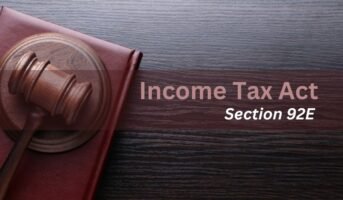Section 10A of the Income Tax Act, 1961 includes special provisions, which allow industrial undertakings to avail of certain tax deductions. The Supreme Court, in 2016, ruled that Section 10A of the Income Tax Act is a provision for deduction and not an exemption. As per the judgement, the stage of the deduction would be done while calculating the gross total income of the undertaking under Chapter IV of the act and not at the stage of computing the total income under Chapter VI.
See also: Section 80CCC of Income Tax Act
What is Section 10A of the Income Tax Act?
Section 10A of the Income Tax Act provides special provisions relating to newly established industrial undertakings in free trade zones (FTZ), EHTP SEZ or STP wherein any profits derived by an assessee shall not be included in their total income.
There are certain conditions that must be fulfilled to avail the benefit, as mentioned below:
- The industrial undertaking must not be formed by splitting up or reconstruction of an already existing business.
- It is not established by the transfer to any new business of machinery/ plant previously used. Under specific conditions, second-hand machinery is allowed.
- The industrial undertaking has started to manufacture/ produce articles/ things during the previous year relevant to the assessment year:
- On or after the first day of April 1981 in any free trade zone; or
- On or after the first day of April 1994 in any electronic hardware technology park or software technology park.
- With regards to an undertaking, which has started to manufacture/ produce any article or thing on or after the first day of April 1995, the exports of such articles/ things are not less than 75% of the total sales during the previous year.
all about: section 10 26 of income tax act
Section 10A Income Tax Act: Tax Holiday
As per a provision introduced by the Finance Act, 1981, industrial units, those which manufacture or produce any article or thing and are established in notified Free Trade Zones (FTZs), are eligible for a five-year total tax holiday. The tax holiday is provided to incentivise companies to establish units and help achieve economic value addition. The profits/gains that qualify for the tax holiday should have arisen out of the core business of the industrial unit and not from other income sources, viz., interest income on money deposited with banks.
Section 10A Income Tax Act: Points to consider
The assessing officer considers certain facts.
- The year in which the production operations start is crucial to qualify for the deduction.
- The undertaking should be situated in a Free Trade Zone, Economic Trade Zone, Software Technology Park or Special Economic Zone (SEZ).
- The sale proceeds should be received in foreign exchange from export outside India within six months from the end of previous year.
- Sale proceeds of goods should be on market value and not understated.
- An audit report is mandatory, as prescribed, along with the return of income.
- The assessee should not claim tax deductions under Section 80HH, 80HHA, 80I, 80IA, 80IB, regarding the same undertaking.
- The assessee should be allowed, even if not claimed, depreciation under Section 32.
- The export turnover does not comprise freight, telecommunication charges or insurance pertaining to goods outside India or expenses incurred in foreign exchange in delivering services outside India.
- If a claim is made for the eighth, ninth or tenth year, then it is permitted only on the creation of a reserved account. If a reserved account is not utilised within a specified period or is used for other purposes, it would be considered income.
What is the penalty under Section 10A of the Income Tax Act?
According to Section 19A, any default made in complying with the requirements, a penalty of Rs 50,000 will be levied upon the company and every officer who is in default is required to pay a penalty of Rs 1,000 per day during which such default continues but not exceeding an amount of one lakh rupee.
FAQs
What is a special economic zone in India?
A Special Economic Zone (SEZ) refers to a geographical region where business, trade and taxation laws are different from rest of the regions in India. The concept was introduced to attract new investments and increase the balance of trade.
What are the differences between provisions of Section 10A and Section 10AA?
Under Section 10A, the provisions apply to all industrial undertakings related to the export of certain things, articles, or software. On the other hand, Section 10AA is applicable to businesses in SEZs. At present, 100% tax deductions in the first five years and 50% deductions for the next two years are applicable for units. For the subsequent three years, it allows 50% deduction subject to certain conditions. Furthermore, the creation of an ‘SEZ Reinvestment Allowance Reserve Account’ is mandatory to obtain the tax deduction.
What is the Section 10 (10A) of Income Tax Act?
According to the Section 10 (10A) of the Income Tax Act, a Government employee will receive tax exemption on the money they receive from accumulated pensions.
What is Form 10A?
As per the Income Tax Act of 1961, various trusts and institutions are required to fill out Form 10A to apply and register under Section 12A, 12AA, 10(23C), and 80G of the ITA.
What Is Section 10 of the Income Tax Act?
Section 10 of the Income Tax Act 1961 mentions the various exemptions that a taxpayer can avail of when paying income tax.
| Got any questions or point of view on our article? We would love to hear from you. Write to our Editor-in-Chief Jhumur Ghosh at [email protected] |
Harini is a content management professional with over 12 years of experience. She has contributed articles for various domains, including real estate, finance, health and travel insurance and e-governance. She has in-depth experience in writing well-researched articles on property trends, infrastructure, taxation, real estate projects and related topics. A Bachelor of Science with Honours in Physics, Harini prefers reading motivational books and keeping abreast of the latest developments in the real estate sector.











